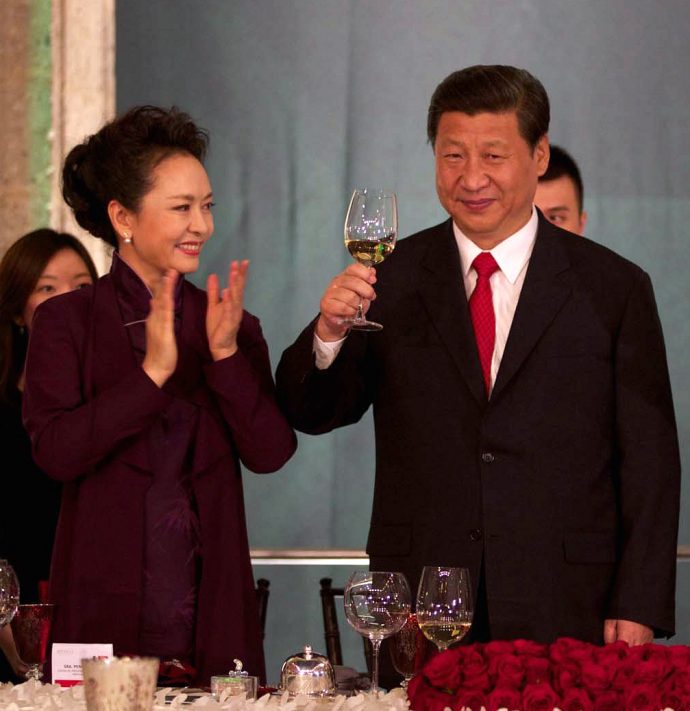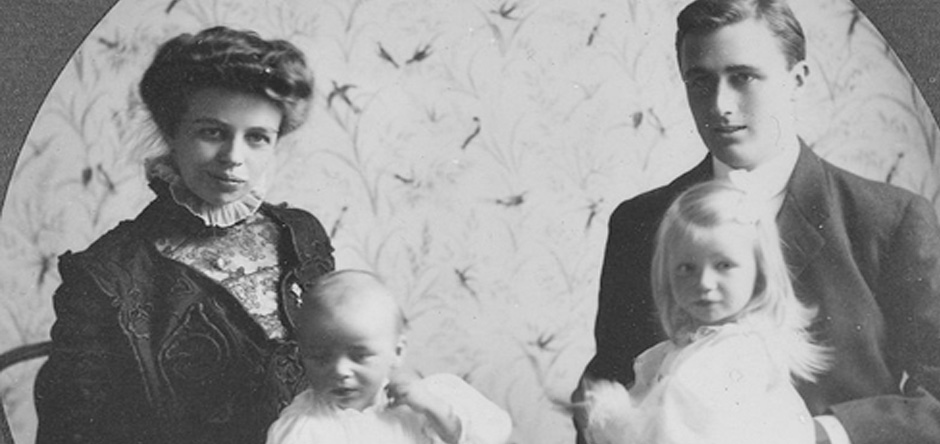The most powerful couple in China – since Generalissimo and Mme. Chiang Kai-shek in the 1940s and Chairman and Mme. Mao Zedong in the 1960s and ’70s – is the country’s “paramount leader,” President Xi Jinping, and his beautiful wife, Peng Liyuan, a well-known singer. Married for 25 years, they have a daughter, Xi Mingze, who enrolled as a freshman at Harvard in 2010 under a pseudonym to avoid publicity. For the greater part of their relationship, Peng Liyuan has had a reputation within China comparable to – and even greater than – that of her political husband. Xi Jinping was one of her millions of fans. He expressed his interest in music and they were introduced by friends.
Born June 15, 1953, Xi is the son of a Communist revolutionary, Xi Zhongxun, who fought with Mao during the Civil War and, after the Communist victory in 1949, helped govern the People’s Republic of China. Then like so many top officials close to Mao, Xi’s father was arrested and jailed during the Cultural Revolution in 1968. Xi was 15 and was caught up in Mao’s Down to the Countryside Movement. He worked as farmhand until he was 22. When asked on state TV about that experience, he said, “It was emotional. It was mood. And when the ideals of the Cultural Revolution could not be realized, it proved an illusion.” In 1980, Xi married Ke Lingling, the daughter of an ambassador to Britain. They divorced after a few years.
Like other descendents of top officials and party figures, Xi became one of the so-called “princelings” – members of the Crown Prince Party whose pedigrees help them wield influence in politics and business. In 2002, he obtained a Doctor of Law degree. The Sunday Times speculated that his Ph.D. was “invented by a committee in order to improve Xi’s public image.” But Lee Kuan Yew, former prime minister of Singapore, when asked about Xi, said, “I would put him in the Nelson Mandela class of persons.”
Peng Liyuan was born in Shandong Province on Nov. 29, 1962. In 1980, at the age of 18, she joined the Peoples’ Liberation Army and served as an ordinary soldier. She performed during frontline tours to boost troop morale during the Sino-Vietnamese border conflicts. Peng earned a master’s degree in ethnic music and won honors in singing competitions. The soprano came to fame, however, during the Chinese New Year’s Gala in 1982, when she performed “On the Plains of Hope.” Today Peng – who has appeared regularly on the gala, widely viewed on CCTV – is dean of the PLA Art Academy and a civilian member of the army, holding a rank equivalent to a major general.
After parental consent, Peng and Xi – the singer and her admirer – were married Sept. 1, 1987, in Xiamen Fijin. Four days after the wedding, Peng returned to Beijing to appear in the national art festival and then immediately left to perform in the United States and Canada. Since then the couple have led largely separate lives, due to their careers.
Peng spends most of her time in Beijing, where she is actively involved in politics herself as a member of the 11th National Committee of the Chinese People’s Political Consultative Conference. She has also been a WHO goodwill ambassador for those suffering from tuberculosis and HIV/Aids since 2011. She is listed as the 57th most powerful woman in the world by Forbes.
Peng has described her husband as hardworking and down-to-earth: “When he comes home, I’ve never felt as if there’s some leader in the house. In my eyes, he’s just my husband.”
Peng has played a much more visible role as China’s first lady compared to her predecessors. She hosted Michelle Obama on the latter’s high profile visit to China in March. Both first ladies have been applauded for supporting the fashion industry in their respective countries and the media were saturated with photos of them in drop-dead outfits.
Since Mao Zedong’s notorious wife, Jiang Qing, leader of the Gang of Four, was arrested in 1976 for crimes committed during the Cultural Revolution and hanged herself in prison, Chinese leaders have avoided showing off their wives in public. But like Chiang Kai-shek, President Xi has no such qualms. The only other first lady comparable to Peng, Mme. Chiang (Soong Mai-ling of the famed Soong sisters) was also widely known for her beauty, elegance and stylishness as well as her political power. I have only seen Peng from a distance, but I was fortunate, as a student at Nanking University, to have had the opportunity to meet Mme. Chiang on several occasions when my father was a diplomat in Nanjing (China’s southern capital).
On National Day receptions, the guests waited in anticipation for her to appear, often wearing sleek gold or silver brocade gowns with a white Pekingese dog tucked into her silken sleeve. She had graduated from Wellesley College and, later as China’s first lady, her pictures appeared in many popular American magazines.
Peng is tastefully low-key compared to Mme. Chiang. Still, she was on Vanity Fair’s best-dressed list in 2013. Her husband wins praise for matching his ties to her outfits, unlike the Generalissimo who usually appeared in a stiff uniform dripping with medals.
Prior to assuming total power, Xi was described in a 2011 Washington Post article by those who know him as “pragmatic, serious, cautious… and seemingly uninterested in the trappings of high office.”
Like many leaders, he’s a mass of fascinating contradictions. He looms large (at 6 feet in a height-challenged and obsessed nation) but carries himself with humility – apologizing to the press for being late during his introduction as president, sharing dumplings with the people and eschewing the presidential limo for a minibus.
He loves Hollywood films like “Saving Private Ryan” and “The Godfather” trilogy but is wary of potentially corrupt Western influences.
He advocates market reform, open government and the aspirations of Chinese youth, but also admires China’s despotic First Emperor Qin Shihuang and his adviser Han Fei.
So the signals thus far are mixed. But two things are certain: He is the most powerful leader since Deng Xiaoping and possibly since Mao Zedong. And for the first time in the history of China, the paramount leader has an equally powerful wife to help women claim their rightful “half the sky” and bring the mystical forces of yin-yang into balance.




